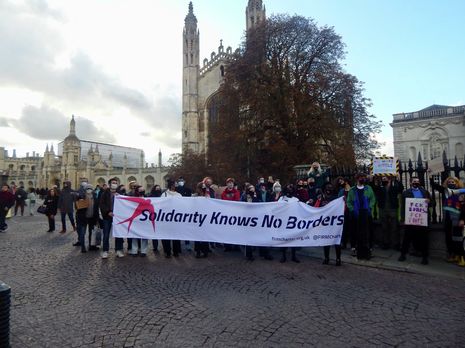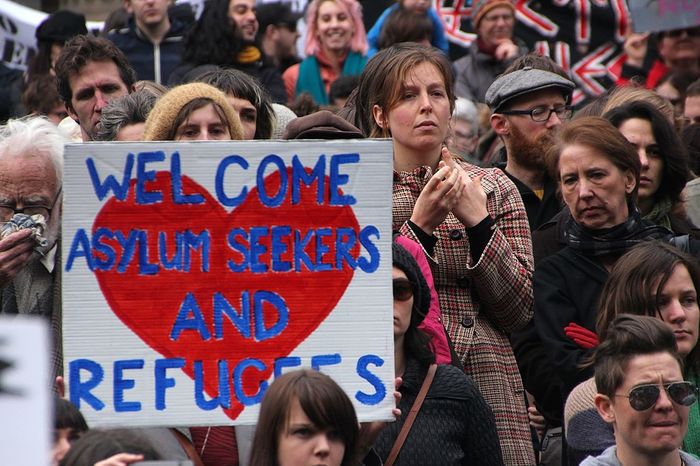Migrant-led resistance to the Hostile Environment highlights that the policy must be abolished
Laura Hone argues that the government must commit to a U-turn on Hostile Environment legislation before more lives are lost.

Content Note: this article contains discussion of death, racism and brief mentions of sexual assault.
The term ‘Hostile Environment’ was first coined in 2012 by then Home Secretary Theresa May. It refers primarily to the No Recourse to Public Funds laws put in place to “create a really hostile environment” for undocumented migrants by barring their access to housing, the NHS and welfare support. Over the course of the past eight years, assaults on migrant rights have risen dramatically as border policing is increasingly outsourced to public services. Despite stringent criticism about the policy’s evidently racist implications, Priti Patel recently warned that the legislation will not be reviewed until at least 2022.
The barbaric nature of these laws, and the need for their abolition, has become particularly stark in the context of the pandemic. A report by the group Patients Not Passports found that the death from COVID-19 of a Filipino man named Elvis was the result of his reluctance to access medical treatment for fear of being reported to the Home Office. Hospital personnel are legally required to check the immigration status of all patients and report them accordingly, which deters those without appropriate documentation from seeking urgent medical assistance. A series of changes to immigration policy since 2014 rule that those who are considered “not to be ordinary citizens” must be charged up to 150% of the cost of their treatment, which is causing high numbers of entirely preventable deaths each year. This directly caused the death of Elfreda Spencer in 2017, a 71-year-old Jamaican woman who was refused chemotherapy by a London hospital as she could not afford the £30,000 bill upfront.
“Over the course of the past eight years, assaults on migrant rights have risen dramatically, as border policing is increasingly outsourced to public services.”
Similarly, research carried out by the Joint Council for the Welfare of Immigrants in 2019 found that 2016 ‘Right to Rent’ legislation incentivises and gives legal credence to racist discrimination and necessitates racial profiling. It requires private landlords to check the immigration status of prospective tenants, which, the report finds, makes them “less inclined to rent to anybody, documented or not, if they’ve got a foreign-sounding name or if they aren’t a British citizen.”
The introduction of a points-based immigration system this coming January will likely lead to a drastic increase in the number of people held in detention centres, as far fewer people are expected to be granted asylum. This should be understood not only as the culmination of eight years of increased border surveillance, but also as an explicit continuation of Britain’s colonial legacy, as it bars people from the Global South from the public infrastructure and services that were built on the back of colonial abuse. If we wish to make headway into redressing the above, stringent border policing must be abolished. Research from the University of Oxford shows that harsher immigation laws do not reduce immigration; they instead make it necessary for people to resort to more dangerous methods of transportation to escape warzones and natural disasters, all of which the UK had a part in creating through foreign policy and the ongoing extraction of fossil fuels. Last October, 39 Vietnamese people were found dead in a lorry in Essex as a direct result of border policing.
Last month marks ten years since Jimmy Mubenga died whilst being held down by G4S security guards as he was deported from the UK. A decade after this tragedy, our government is still ignoring the calls to end deportations and abolish No Recourse to Public Funds laws. Demonstrations, vigils, and banner drops organised by migrant-led groups such as Migrants Organise and Regularise have occurred in over 20 cities across the country last month in commemoration of his death. At a protest in Cambridge’s town centre on the 11th October, an anonymous spokesperson from the migrant-led group Regularise spoke on how he became undocumented in 2012 as a result of the stricter immigration laws introduced that year. He stated that undocumented migrants “are at a high risk of being exploited by employers [and] unscrupulous landlords. It is a precarious life filled with fear and anxieties that have certainly been increasing and worsening during the COVID-19 pandemic.”
Many of the protests that occurred in the past four weeks centred their demands on the recently launched Fair Immigration Reform Movement Charter (FIRM). The Charter was written as a collaborative effort by a range of different migrant groups in response to the increasing number of migrant deaths in recent years at the hands of the Conservative government, the police, and border control personnel. It demands “full equal access to education, welfare and the right to work for all migrants and people seeking asylum”, and “an immediate end to immigration enforcement, raids, detention and deportations.”
Indeed, despite the bleakness of the situation, powerful migrant-led resistance is growing across the UK. Groups such as Step Up Migrant Women Campaign, All African Women’s Group and Women Against Rape have all been formed in response to the numerous cases of migrant women being arrested when reporting their assault, and groups such as Docs Not Cops are currently campaigning to abolish “the imposition of borders within the NHS”. The work of these groups highlights that Hostile Environment policies cause such intolerably high rates of both recorded and unrecorded deaths each year.
To support the movement fighting for a country where no one is deemed illegal, where refugees are not used as scapegoats for the chronic underfunding of public services, and where borders do not arbitrarily demarcate the difference between life and death, sign the FIRM Charter here: https://firmcharter.org.uk/
 News / Clare Hall spent over £500k opposing busway 24 December 2025
News / Clare Hall spent over £500k opposing busway 24 December 2025 Comment / The ‘class’ of Cambridge24 December 2025
Comment / The ‘class’ of Cambridge24 December 2025 News / Caius mourns its tree-mendous loss23 December 2025
News / Caius mourns its tree-mendous loss23 December 2025 Comment / League tables do more harm than good26 December 2025
Comment / League tables do more harm than good26 December 2025 News / Eight Cambridge researchers awarded €17m in ERC research grants27 December 2025
News / Eight Cambridge researchers awarded €17m in ERC research grants27 December 2025









